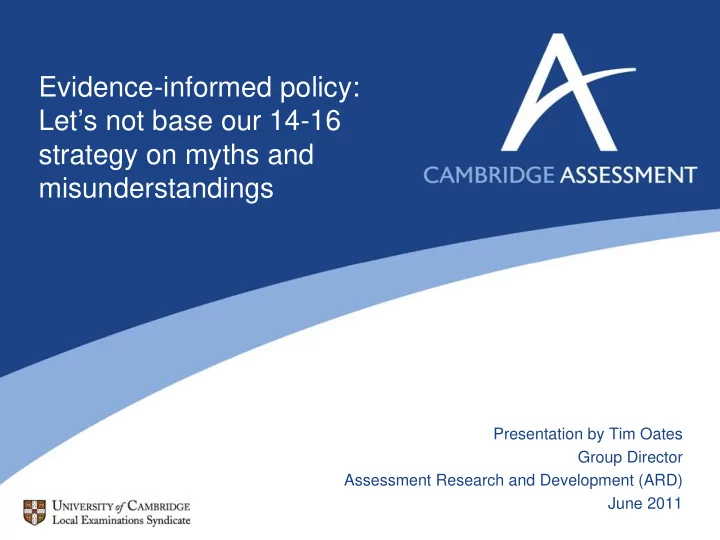

Evidence-informed policy: Let’s not base our 14-16 strategy on myths and misunderstandings Presentation by Tim Oates Group Director Assessment Research and Development (ARD) June 2011
Myths • High performing systems are not ‘routed’ systems • The A level system is narrow and inflexible • We need ‘a system’ which everyone can understand • Parity of esteem must be achieved
Myth 1 High performing systems are not ‘routed’ systems • Dual system countries – Germany, Austria, Switzerland – around 45pc • Finland – 94pc remain in education and training after 16; 45pc in vocational schools • Netherlands – vocational route from year 9 – high esteem system – 40pc • Australia – 40pc on upper secondary vocational route • In ‘integrated’ or ‘unified’ systems, people make choices.
Myth 2 The A level system is narrow and inflexible • A levels allow high intensity HE • Top combination maths, biology and chemistry taken by just over 4pc of candidates • 21,000 combinations and we stopped counting • We achieve high levels of general education early
Myth 3 We need ‘a system’ which everyone can understand • The WHOLE system? • The spurious claims of the NQF • Of course people need to make informed choices • Fitness for purpose • Opportunities for movement across routes at key points
Myth 4 Parity of esteem must be achieved • Fitness for purpose is more important than parity • Pursuit of parity has given us ‘academic drift’ • Diploma rationale perpetuated myths of a unified system • Real apprenticeship is worth pursuing • Weak apprenticeship has fuelled substitution
14-16 – 16-19? Routes from 14? • There ARE gaps – early taking of GCSE maths • Obsession with qualification-led change • Stop pursuing the wrong goals – parity of esteem, a ‘tidy’ system • The importance of ‘essential elements’ of maths, science and literacy • We should NOT see the issues as vocational VERSUS academic
Recommend
More recommend